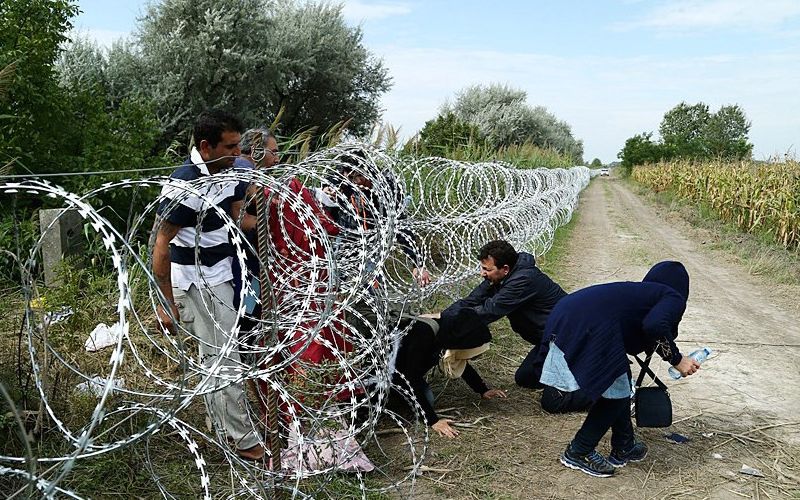
The Refugee Crisis and the EU’s Future
Since the start of the Syrian Civil War in 2011, the European Union as a whole has struggled mightily to effectively combat the growing refugee crisis that strains the very fabric of its cohesion. As it stands, approximately half a decade into the bloody struggle, fearful refugees largely from embattled states such as Syria and Iraq have poured into Europe at a breakneck pace. The European Union and its 28 member states have thus far been entirely unable to implement any meaningful strategy to cope with the effects of a continuous wave of immigration that numbers well into the millions. Yet the strains of this crisis have led many states to be increasingly dissatisfied with perceived systemic failures within the EU to the point of member states seriously entertaining the notion of renouncing their membership.
As has often been said, the European Union, having had its foundations poured in the wake of destruction left by World War II, is supposed to be a multi-national organization that shares a common set of values, chief among them being those of human rights and consistency in the rule of law. However, as the world has witnessed over the last several years, the European Union has been demonstrably void of solidarity in spirit and unity in policy. Therefore, if continued European integration is desired, what must the European Union do in order to adequately respond to the refugee crisis? Perhaps the larger issue is whether or not further integration is even a realistic possibility.
First and foremost, many observers believe that the European Union has at its disposal the resources to address the refugee crisis in a more impactful manner than it has been. According to the World Bank, it possesses an economy with a collective GDP of approximately $18.5 trillion dollars, and it encompasses roughly 508 million people. With a powerful economic machine behind it, one must ask the question if further strides in European integration are deemed to possess a level of cost that outweighs the probable benefits. If the European Union is to continue to progress, it must act in unison to not only address the symptoms of the refugee crisis, but it must also proactively attack the heart of the ailment itself. It must provide solutions to ease the suffering of the Middle Eastern and North African regions that foster the creation of millions of refugees.
First, one needs to examine the historical scope and the magnitude of the current refugee crisis before definitive policy solutions can be prescribed for combating the crisis.
The reality of the refugee crisis is that Europe is positioned right on the doorstep of a mass exodus of civilians fleeing persecution at a rate not seen since World War II. Estimates now indicate that some four million Syrian refugees are being housed in Turkey, Lebanon, and Jordan, effectively overwhelming accessible states within the affected region.
A common and justifiable argument has often been given which advocates that particularly Arab nations, as well as states around the globe, must take an active role in tackling the refugee crisis. However, as indicated, amenable Arab states are hard-pressed to further open their borders.
Current unrest in Egypt suggests that the nation’s five million Copts are, possibly setting the stage for an exodus. In Africa, Eritrea and its 25 million citizens are currently embattled and their migration could further exacerbate refugee crises in both the Middle East and Europe. As such, given the proximity and the comparable logistical ease of traveling to Europe, the reality is that this is an issue that the EU simply cannot afford to waste time on enlisting the support of global partners.
The emanations from Brussels have been particularly weak in the face of this lingering and intensifying crisis. As president of the European Council, Donald Tusk, stated in 2015, “We are talking about millions of potential refugees trying to reach Europe, not thousands.” A recent poll in Afghanistan found that one quarter of all Afghans are inclined to flee their nation to escape the perpetual fighting, with an estimated 100,000 Afghans expected to flee to Europe. To put the magnitude of the refugee crisis into perspective, following the dissolution of Yugoslavia, some 700,000 migrants fled into neighboring European states. To date, approximately two million Iraqi refugees have fled the country, the majority heading to Europe. Overall, roughly one million entered Europe in 2015 alone, and Serbia alone was absorbing 10,000 migrants per day. It is exceptionally clear that as traditional apparatuses of authority continue to decline in the Middle East and North Africa, the crisis will not only continue, but may very well intensify.
Recently, a European Union proposal proffered by European Commission President, Jean-Claude Juncker, set to bind member states to a quota system that mandated the acceptance of some 120,000 refugees. Ultimately the proposal failed after receiving intense criticism from several Eastern European nations, notably Poland, Slovakia, Romania, and the Czech Republic. Following the breakdown of negotiations, EU Commissioner for Migration, Dimitris Avramopolous, stated, “We did not find the agreement we wanted. A majority of member states are ready to move forward. But not all.” Meanwhile, some 160,000 migrants applied for asylum in Sweden, and Germany accepted some 800,000 migrants in 2015 alone, and several prominent European Union secession movements, notably Britain’s “Brexit,” loom large.
Indeed, and particularly in the face of the rapidly deteriorating relations between European Union member states, drastic action is required if integrative progress is to be achieved. First and foremost, member states must demonstrate the sentiments of solidarity that have driven decades of integration. As such, if further integration is desired, the member states are pressed to streamline their respective immigration and legal practices. Furthermore, with forecasts predicting the crisis to continue and possibly intensify, the European Union’s member states may very well find themselves forced to militarily and diplomatically intervene in Syria and possibly Iraq. If the inability to coordinate the domestic policy of the respective member states continues, it may become a necessity to conduct expanded military operations to physically resolve the unrest that created the refugee crisis.
To date, both the Schengen Agreement and subsequent Dublin Regulations have faltered, although few would argue that these accords were ever comprehensive or capable of dealing with such a crisis. Greece, was released from its Dublin Regulation obligations in 2011. In June of 2015, Hungary stopped accepting migrants as well, going so far as to erect razor wire fences along its borders. Two months later after the almost universal faltering of the economically vulnerable European Union Border States bearing the brunt of the crisis, Germany was forced to suspend the Dublin Regulations for Syrian refugees who reached its territory. German Chancellor, Angela Merkel, even warned that the inability to amicably settle refugees could threaten the very existence of Schengen. Yet, as Germany has accepted nearly one million refugees, Europe’s second and third largest member states have exhibited limited intent to assist. France has agreed to accept 24,000 refugees, and the UK has stated that it will accept 20,000 refugees over five years.
In all reality, what appears to be the only feasible, albeit improbable, solution to creating a policy framework capable of effectively solving the problems stemming from this crisis is further integration. To that end, the EU has drafted new rules and proposals, but it currently appears that it will be almost impossible to implement them. However, this is not an entirely new issue for the European Union as it has long failed or its member states have simply proven unwilling, to harmonize their asylum policies.

The most recent rumors swirling around Brussels involve the veritable scrapping of the Dublin Regulations. The proposed replacement system proposes that migrants will be “quasi-automatically” allocated to member states. It is not entirely understood if the proposed changes would incorporate a mandatory or voluntary allocation system. However, given the previously mentioned failure of prior proposals entailing mandatory quotas, one can only envision that the forthcoming proposal’s allocation system will be voluntary. To that end, such a policy might ease tensions amongst member states in the short run, even if its impact on resettlement may be questionable, but it may very well exacerbate animosity between member states over the equitable distribution of burden sharing within the European Union over the long run.
The other grave issue that has emerged from the refugee crisis, is the perceived threat that mass immigration poses to individual member states’ national security. This motivating factor on retaining sovereignty directly follows the ISIS-inspired attacks in Paris, and a recent Europol report that stated “IS is preparing more terrorist attacks, including ‘Mumbai-style’ attacks, to be executed in member states of the EU, and in France in particular.” In response to such threats, many European Union nations have implemented strict border controls, and have even posted troops in their capital cities. To this end, Austria, Denmark, France, Germany, Norway, and Sweden have all undertaken the process of locking down their borders. Currently, Article 26 of the Schengen Borders Code allows for the extension of border controls for Schengen countries for up to two years under “exceptional circumstances.”
In light of such widespread fears of terrorist attacks, and the status of member state economies still teetering from the lingering effects of the Eurozone crisis, it appears highly unrealistic that the European Union will be able to militarily or diplomatically address the violence that has cultivated the refugee crisis and appears capable of propelling it for years to come. Following the aforementioned attacks in Paris, and struggling to both conduct military operations against ISIS and simultaneously defend the homeland, France declined to invoke Article 222 of the Lisbon Treaty, which stated, “the union and its member states shall act jointly in a spirit of solidarity if a member state is the object of a terrorist attack or the victim of a natural or man-made disaster. The union shall mobilize all the instruments at its disposal, including the military resources made available by the member states.”
Instead, France invoked the non-compulsory Article 42.7, which states, “If a member state is the victim of armed aggression on its territory, the other member states shall have towards it an obligation of aid and assistance by all means in their power, in accordance with Article 51 of the United Nations Charter.” The more tepid Article 42.7 requires the invoking nation negotiate aid from its European Union counterparts. To that effect, only the UK immediately offered military support to France. Germany ultimately declined, its Defense Minister, Ursula von der Leyen, stating that the mutual defense clause only served as “a basis for consultation.” Frustrated by the lack of solidarity in the face of a threat, French Defense Minister, Jean-Yves Le Drian, stated, “France can’t do everything. It can’t act alone.”
Effectively the limitations of the European Union have been painfully highlighted, which perhaps better illustrates the inherent force that restricts further integration. That force is national politics. In light of national security fears, economic concerns, and fears of a loss of sovereignty there has been a noticeable rise in the strength and momentum of far-right national politics. In the UK, the far-right party UKIP has surged, largely propelling the nation towards an exit from the European Union. Such public pressures have even pushed Prime Minister, David Cameron, to acquire concessions from the EU that the UK will obtain an “emergency break” on migrants’ access to benefits, and has secured recognition that it is no longer committed to further political integration within the EU. In Germany, the progression of the refugee crisis has caused Chancellor Merkel’s approval rating to plummet 29 points in only a year, settling at 46 percent, the lowest approval rating of her entire tenure.
Perhaps more sinister, Europe has been gripped by a fairly prominent public sentiment of skepticism concerning the influx of culturally dissimilar migrants. Former German Foreign Minister, Joschka Fischer, recently commented on this startling trend by stating, “Throughout Europe, xenophobia and open racism are running rampant, and nationalist, even far-right parties are gaining ground. At the same time, this is only the beginning of the crisis, because the conditions inciting people to flee their homelands will only worsen. And the EU, many of whose members have the world’s largest and best-equipped welfare systems, appears to be overwhelmed by it-politically, morally, and administratively.”
The chaos inspired by this crisis is both palpable and headline-grabbing. In the Netherlands, increasing frustration with economic and political inequality among member states is leading to a cooling of Dutch sentiments towards the European Union. In both the UK and France, far-right parties have risen to great heights on the back of promises to halt immigration. Austria and Slovenia have threatened one another, with Austria calling for the withholding of aid from EU member nations failing to properly process refugees. Hungary’s once lambasted stance on migrants is gaining acceptance on the continent. Denmark has attracted criticism for requiring all refugees to finance their stays. Germany has seen a great rise in the volume of mass demonstrations calling for limitations on the acceptance of refugees. In Finland, a loosely assembled vigilante group called the “Soldiers of Odin” are prowling the streets in order to defend Finnish women against perceived Cologne-styled assaults.
The reality is that the European Union has largely proven itself to be a confederation with its chief priority firmly rooted in economics, not shared values. Over many decades as Europe recovered from two world wars and the colonial system, integrative efforts have largely been cast in support of economic prosperity. Political integration did not make exceptional strides until the mid-1990s. The EU’s “Pillar Two,” its Common Foreign and Security Policy, for example, requires unanimous consent from all 28 member states and its initiatives can be vetoed by a single state, even at that. It is an incomplete and failure-prone framework. The reality is that recent history has shown that EU member states are increasingly prioritizing national agendas above that of enhanced integration of a non-overt economic nature.
Thus far, EU member states have exhibited a declining desire to compromise non-economic autonomy for increased integration. As it stands, the prospects of achieving an EU-wide consensus that establishes a consolidated legal system and judiciary which better facilitates the exchange of information and intelligence, a common immigration policy that allows for the direct and comprehensive combating of the refugee crisis, and a joint defense policy which eases national security concerns, are quite dim. Therefore, it is uncertain if any sort of further streamlining or merging of member states’ legal, security, and political policy is forthcoming. Without such fundamental changes, future European integration is certainly in peril

